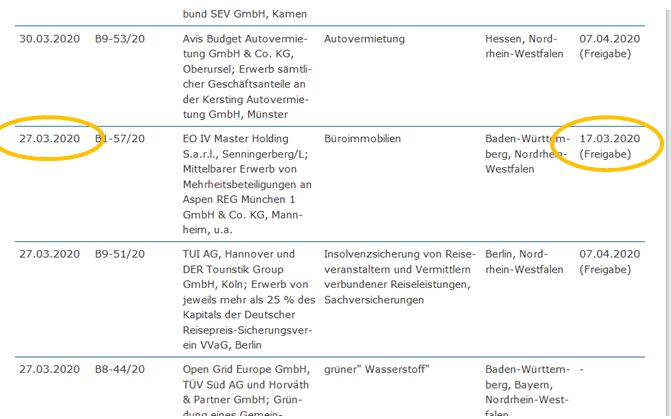
SSNIPpets (38): Phase II
In the antitrust community, the term “Phase II” has so far triggered thoughts about merger control: This is where Phase II is rather frightening. Today, “Phase II” gets a new meaning, even with competition folks – it is the gradual reopening of public life after the shutdown. Rupprecht Podszun is in his SSNIPpets phase. Here are his small but significant news, information and pleasantries – our pet project!
Stop the clock
Since we had collectively been ordered into isolation a few weeks ago, terms have been reoccupied. “Phase II” in COVID-World refers to the period of easing the shutdown. And “stop the clock” also has a whole new meaning. In the past, “stop the clock” was the moment in merger control when you noticed that things were not going to continue as they were. Clock stands still, time freezes, the only light at night is in that law firm where a young associate on the brink of quitting for a career in the Commission is desperately trying to get in touch with people in the merging company who can answer some questions…
In 2017, Christopher Cook from the Cleary Brussels office had compiled for Concurrences, how long merger control proceedings really take. Quite interesting: in 2005, an average of 60 days passed from public announcement to notification in a “normal case”, 46 days in Simplified Procedure. By 2016, the figures were 112 and 65 days respectively in this informal “phase 0”. As for the actual procedure, Cook writes:
“Phase II reviews therefore routinely take 125 or more working days; cases decided within the basic 90 working-day calendar have all but disappeared.”
Cook’s statement is still a subtle understatement in many cases. Bayer/Monsanto was notified on 30 June 2017 and a decision was taken on 21 March 2018. That’s 264 days (the conversion into Commission working days was too complicated for me, sorry). Sure, Bayer/Monsanto was certainly one of the most complex cases ever. But also for Apple/Shazam, which – as always in digital cases with DG COMP – ended with a first-class non-opposition, took 176 days from notification (14 March 2018) to decision (6 September 2018). Please keep this in mind the next time you declare that a merger control procedure will take roughly 1 plus 3 months. If, like Cook, you add informal pre-notification, the effect is dramatic and, as Cook writes, it’s very easy to speculate that deadlines at the end cause longer and longer informal periods in the beginning. “Stop the clock” is then only a last desperate act in search of lost time.
Greetings from home

Now time has stopped (and at the same time it is racing), each day feels like the next one. How many days do we actually already live in this loop? And how many working days? It seems to be forever, but still you haven’t managed to read Marcel Proust, unpack the saxophone again or learn something useful, like sign language with video tutorials.
When the routine is broken on these ground hogs days, it’s especially nice, and so I was happy about every virtual greeting card from home that reached the editors of this blog. After all, sending such greetings is not as simple as it sounds. Simple things (“make a selfie at your desk and write a few lines about working remotely!”) are often so difficult. But Cristina Caffarra, Florian Ederer, Elisabeth Eklund, Damien Gerard, Juan David Gutierrez Rodriguez, Justus Haucap, Florian Haus, Silke Heinz, Gerhard Klumpe, Tilman Makatsch, Jens-Olrik Murach and Markus Wirtz took the challenge. (Admittedly, Cristina Caffarra did not take a pic at her desk, but next to her samurai in full armour, but that’s a lovely one, too!) Every time we found such a “digital postcard” in our mailbox, it was a joy, because every time I read between the lines: I still exist, I still think of you (i.e. the readers of D’Kart) and, yes, we’ll manage to get through this somehow.
(Hope is very good anyhow, says psychiatrist Dr. Dogs in this interesting one-hour talk (in German).)
So take another look at Greetings from Home and think of your travels to faraway countries as you would with analogue postcards: “Oh, look, honey, they’re in Bali!” – “Oh, look, honey, look what Justus Haucap has on his desk!”
„The new Deutschland AG“
Speaking of our Düsseldorf colleague Justus Haucap: He is quoted by Manager-Magazin as saying that politics has “fortunately done many things right” during the crisis (this is on German politics). (If you’re wondering now: Why does Podszun quote Haucap from Manager-Magazin instead of just bumping into him on campus and asking him in person – then because – well, you know). The article has the nice headline “The new Deutschland AG” and deals with state involvement into business, including the buying of stakes in ailing companies. Haucap’s quote continues as follows:
“But I also see the temptation for politicians to transfer their increased role to the post-crisis period – that would be dangerous for our economic order.”
Absolutely. The state is back, also as a powerful player in the economy, and it is up to Margrethe Vestager to set limits, so that we do not wake up post-Covid in an economy where Big Government is kneading around with its visible hands. The current guidelines look good.
The crisis will probably change the market structure significantly: In a few months some companies will be gone, others will be owned by different people than before. Is that good – in the sense of a market shakeout? Is that bad – in the sense of a wave of concentration?
News about the German competition bill (but not what you’re thinking)
The amendment of the German competition act “GWB” has not moved from the Ministry’s draft to an official Government draft approved of by the Cabinet. Now the government has other things to do at the moment, but I thought that everything was now neatly in place… The Ministry of Justice does not seem to agree (which is strange regarding the fact that the details have been sorted out and the bill is not a partisan project of the CDU-Ministry of Economics).
At least, stakeholder statements have arrived in the meantime that were still amiss at the hearing of associations by the Ministry. Deutsche Telekom, for example, wants a specialized digital agency that regulates ex ante. IT association Bitkom has taken the longest, which is no wonder considering the list of members, which ranges from Google to Telekom. And so Bitkom finally states in all frankness:
“The draft of the 10th GWB amendment is assessed differently by Bitkom members. Some companies welcome the amendment as, in their view, it takes account of negative market developments. (According to these members) The emergence of market power, dependencies and market entry barriers follows new rules, especially in digital markets today. (In their view) The draft correctly focuses on these issues and addresses them in an appropriate form. Other parts of the membership see the amendment critically, especially since, in their view, empirical evidence for the necessity of new instruments in abuse control is missing or studies commissioned by the Federal Government have negated this necessity and advised against comprehensive changes in abuse control.”
For empiricism, I have great pieces for you later on. There are signs of a competition of the Higher Regional Court Senates in Germany! Cliffhanger!
I understand the amendment of the abuse provisions not least as a signal to be sent into the EU. National rules for digital markets are suboptimal, é claro, but as long as there is no movement in Brussels, the impulse from Djermany is needed. Perhaps more needed than ever: Big Tech naturally plays a certain role in the age of staying at home. Anyone who concludes from this that one should now be “more lenient” towards the GAFAs is falling into a trap that we call “dominance”. Being dependent on the GAFAs now means first and foremost that they have a lot of power. And how much better would we possibly fare in the crisis if there was more than one Google? We call that “counterfactual”, btw.
In the meantime, however, the Federal Ministry of Economics has not remained inactive with regard to the German competition act. There is a so-called “Formulierungshilfe” (this is a technical term used in Berlin parliamentary circles), and it proposes to amend the competition act in order to mitigate the consequences of the pandemic.

In more concrete terms, two paragraphs will be added to § 186 GWB for a limited time. Firstly, the merger control timing regime will be changed. Phase I may take longer, so may Phase II, since it may be difficult to get the information in time. Secondly, the obligation to pay interest is reduced to zero in cases where companies were granted facilities of payment. These changes are to be introduced asap. (We document the text in the German version of these SSNIPpets).
From the institutions – EU
The European Commission is rubber-stamping state aid applications. Is that still some form of substantial examination or is it just the shell of what had been meaningful investigation proceedings before? Hard to tell. The more astronomical the sums distributed, the faster the examination procedure. This had already been the case during the financial crisis, and the lesson is well learned: The restrictions in state aid law are for good times.
In antitrust law this is somewhat different (my humble opinion). It is needed at all times, but it is also flexible enough to be able to respond to current difficulties without substantial changes to the law. (The amendments referred to above are not substantial).
The Commission published an Antitrust Temporary Framework (as you probably already know from all newsletters). Fun fact: If you click on the link to the Temporary Framework from the Corona page of the Directorate-General for Competition, you will be taken to the EUR-Lex page which links to the Commission’s Communication. And that page is in French, not, as usual, in English. Is that Brexit?
From the institutions – NCAs
ECN and ICN have published common-sense position papers here and here. So far the Bundeskartellamt has been behaving inconspicuously, which I like. But it has published a new organization chart. There is no new Decision Division C (for Corona) yet, but Decision Division V (for Consumers which is Verbraucher) has been given new powers. No, no, no consumer protection. The V-people of the Office, who – it seems – are hoping in vain for new powers in the course of the 10th amendment of the competition bill, may now do a bit of antitrust law again. The department is therefore now called “Competition and Consumer Protection”, and the sectors of culture, sports, entertainment, books and fairs have been assigned to it. The 6th Decision Division was relieved of its workload in this regard and now focuses entirely on media, Internet and advertising.
The Bundeskartellamt is also working at full speed. McDermott’s Daniel von Brevern spotted that the Office occasionally even clears mergers before they had been registered. This seems to have happened in a real estate deal, see Exhibit 1:

The turbo department, which presumably possesses clairvoyant abilities is B1. Chapeau!
The British CMA has published a far-reaching Guidance Paper, and the government has relaxed the antitrust law „to feed the nation“. Cambridge law professor Oke Odudu addressed this issue in the awesome lunchtime zoom series “Competition Law in Isolation”, organised by Or Brook and Magali Eben under the umbrella of ASCOLA UK. This is for all those who feel somewhat alone at home: Zoom in, every Wednesday and Friday at 1 pm Düsseldorf time! More information can be found on the Twitter or Linked-In account of ASCOLA UK.
ASCOLA is the Academic Society for Competition Law, which unfortunately also had to cancel its annual conference in Porto as a live event. Fortunately, there are online formats, even if the virtual meetings have lost the charm of the first days. At the Law Faculty of Heinrich Heine University we are doing all teaching online, e.g. I do my exam prep class on real estate law – a delicacy on the menu of studying law in Germany – via Zoom as well as my introduction to Competition Law. It works.
Others have also switched to online. Concurrences does webinars and – watch out, please, this is self-preferencing now! – the journal WuW invites for the WuW-dialogue. The first episode with Andreas Mundt will take place on Wednesday, I have the privilege to host it. It’s free (as long as you consider the disclosure of some data during registration as free of charge). – End of self-promotion. –
Empirical delicacies (1)
Our beloved first senate of the Higher Regional Court of Düsseldorf has once again spoken plain language, which we like per se, because (as far as we are not affected ourselves) we prefer to read clear sentences rather than swollen words. The senate had to review the Bundeskartellamt’s prohibition of the Remondis / DSD Duales System merger. In July 2019, the Bundeskartellamt had prohibited this mega-merger in the waste disposal industry, inter alia because of the creation of a dominant position in the market for processed hollow glass cullet [Is that the right jargon in English? – Doesn’t matter!]. The parties to the merger tried to convince the Düsseldorf Court of the opposite and also submitted an economic expert opinion. To no avail:
“The private expert’s opinion submitted by Remondis is of no significance in this context. The arithmetical games played by the privately paid experts are results-oriented. They support the thesis of the negotiating power of the glass manufacturers and the thesis of the lack of pricing leeway for glass processors. The calculations made in the expert opinion of …….. (pages 50 and 51 of the presentation of …….) are not valid and useless for several reasons.“
Please note that the English translation does not capture the full beauty/abrasiveness of the original German version.
Empirical delicacies (2)
However, it is not only the Düsseldorf Court that takes on economic expert opinions. The Higher Regional Court of Schleswig-Holstein had to decide in a trucks cartel case. Everything was disputed, of course. The most Northern of Higher Regional Court writes about the submitted expert opinions, and that’s not without smugness:
„Insofar as the defendant refers to the final report of … dated November 14, 2018 (…), the statements made there relate – possibly with good reason – only to the years after 2007, which are not relevant here – when the last acquisition took place in 2006.“
And in another place (this time it is the turn of another economic consultancy):
“Moreover, these opinions do not reach any convincing conclusions, since, as the authors emphasise on several occasions (see points 1.9, 2.7 and 4.1 et seq.), the mandate requires that the assumption – which is incorrect, as already discussed – be that there was merely an exchange of information. The defendant does not claim that agreeing on gross list prices does not increase the damage (…).”

In short:
“In view of the insubstantiality of its submissions, the Senate also does not consider itself obliged to further pursue the offers of evidence or the testimonies of the experts commissioned by it for their well-documented expert opinions, which are always cited by the appellants for alleged peculiarities and allegedly not given necessary conditions.“
The judges in Schleswig express themselves in a generally rather snappy way. Is there a competitor growing for the Düsseldorf judges? Competition of the Higher Regional Court Cartel Senates for crisp wording? This passage on the trucks cartel is also written with a sharp pen:
“In the circumstances described above, the Senate considers it practically impossible, on the basis of Paragraph 286 of the Code of Civil Procedure, that the prohibited concerted practices could not have had any effect on retail prices, especially in the period from 1997 to 2006. This would presuppose that, over a period of almost 10 years, none of the high-ranking management and controlling employees involved in the agreements in seven large international groups would have thought that the figures illegally agreed upon could in fact have achieved no benefits for the cartel members. This seems just as absurd as the (further conceivable) possibility that these employees had not been able to communicate their findings sufficiently, or had not done so successfully.“
I am not quoting this with malicious glee, not with approval, not with rejection. I am quoting this here only in fulfilment of my faithful duty as yours truly – and because I believe that it shows various developments that would exceed my current capacity of writing in this context.
Here is one more urgent request: Do not read this article under any circumstances. And most of all, do not send the link to anyone else. You will pay for it bitterly one day, if you do it anyway. I have warned you! (It is in German anyway, hahahahahaha!)
In case you do not notice – it’s the weekend! Have a good start to Phase II (if possible)! Stay safe and take care of you and others.
One thought on “SSNIPpets (38): Phase II”